Mandalay, the formal royal capital of Myanmar is a city with beautiful pagodas, bustling alleyways and some unique architecture. Given a first look, the city looks like any other Southeast Asian city with upcoming big buildings, busy streets and smiling people. However, there are many interesting and unique things to do at Mandalay. In our recent Myanmar backpacking trip, we had kept 2 nights at Mandalay and the city surprised us with its rustic charm and individual attractions. Here, we have put together a Mandalay Travel Guide for you so that it helps you to find out what to do and places to visit in Mandalay.
Mandalay – Revisiting Burma’s ancient capitals
Mandalay captures our imagination as Myanmar’s last royal capital before British colonized the country. There is a subtle romanticism about the past that we love to feel and visiting Mandalay was like indulging into it. But what we did not know that when we visited Myanmar that Mandalay was definitely not the oldest and only capital of Burma or even the longest serving capital. Just located around the city absorbed into the suburbs of this famous city are three other ancient royal seats of Burma – Sagaing, Ava (Inwa) and Amarapura. All the three combined had been the seat of power for more than 500 years compared to Mandalay’s 26.
Unique things to do in Mandalay and Places to visit in Mandalay

Marvel at largest iron Buddha at Sandamuni Pagoda
The Sandamuni Pagoda located near the Mandalay Hill and is famous for the largest iron Buddha (also known as Sandamani). The Buddha statue is made up of almost 41000 pounds of iron and is covered by a layer of gold and more gold leaves are added by the believers each day. There are eighty other statues of saint disciples, which are found in mini stupas around the pagoda. There are also 1774 marble slabs inscribed with the teachings of Lord Buddha.

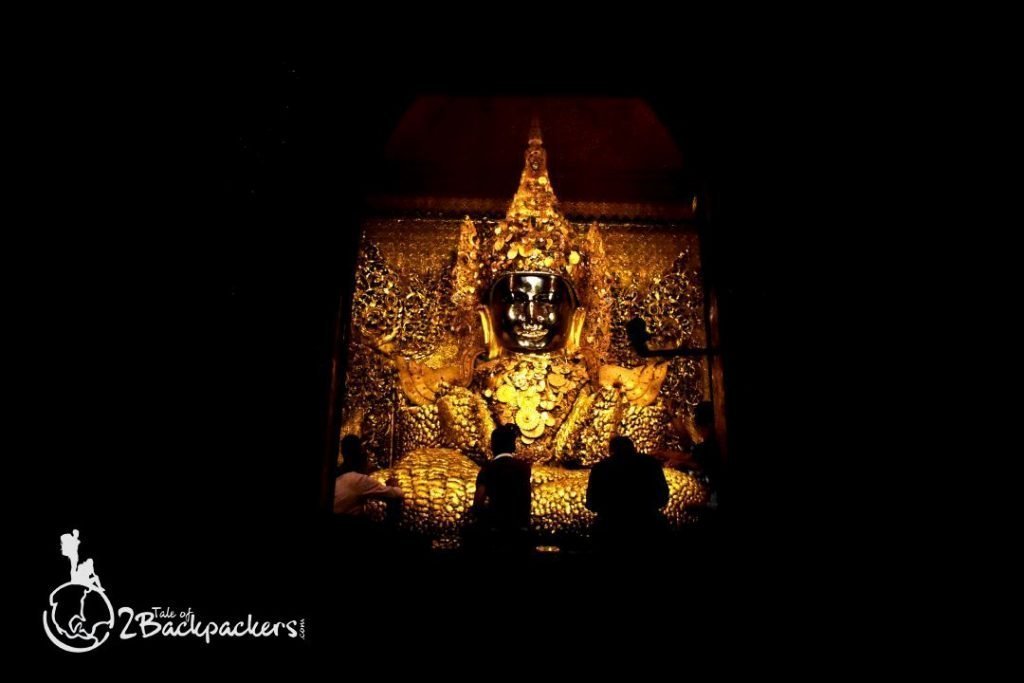
See the World’s largest book at Kuthodaw Pagoda
It is called the World’s largest book! But do not go looking for a large sized book in the temple complex. What catches the eye when you first enter the complex is the striking temple building with a gilded exterior giving it the look of a golden temple. But the spectacle lies somewhere else. There are stark white stupas surrounding the main pagoda in long rows. Beneath the pinnacles and inside the stupas lie 730 marble tablets. 729 tablets contain the body of the Tripitaka. The 730th tablet describes the creation of the entire spectacle. Kuthodaw Pagoda lies just east of Mandalay Palace and very near to the Sandamuni Pagoda.
It is said that if you read 8 hours a day, it would take a year to complete reading all that is written in the tablets. Little wonder it is called World’s largest book!

Watch the sunrise at U-Bein Bridge
The iconic bridge stretches across Taungthaman Lake in the Amarapura region and is said to be the longest teak wood footbridge. Almost covering 1.2 km across the shallow lake, the slightly curved bridge is supported over 1086 wooden pillars hammered to the bottom of the lake. This long bridge without any rails is one of Myanmar’s most photographed sites.
U-Bein Bridge looks surreally beautiful during the sunrise and after the sunset when the sky plays with colours of golden yellow and orange. The most striking time is perhaps just after the sunset, but that is also the time when you will find maximum visitors there including the locals and the vendors selling trinkets. The affection that U-Bein had received also took a toll on it. Now a few of the thousand pillars have been replaced by concrete pillars and many of the original planks have either been replaced or in dire need of replacement.
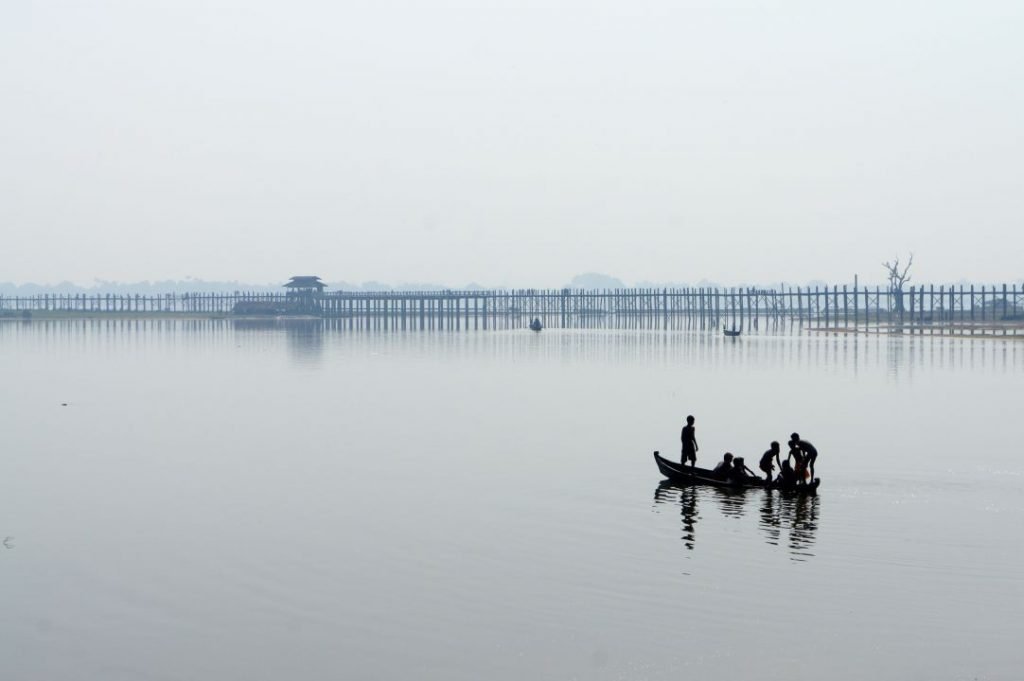
Did you know, the planks of the teak making up the bridge had been brought from the old royal palace at Inwa, the former Burmese capital?
Traveller Tip: Try to visit U-Bein Bridge during the sunrise. It is comparatively less crowded.
Amarapura literally means ‘the city of immortality’. Situated only 11 km from Mandalay town, Amarapura is now known for silk weaving and you can visit the workshops to see how these products are made. It had served the capital of Myanmar twice from 1783-1821 and from 1842-1857.
See the sunset from the Mandalay Hill
Head towards the Mandalay Hill to get a panoramic view of the entire city. The 240 metre hill can be seen from many places in Mandalay. We would suggest you to visit during the sunset to get an epic view of the entire city, Mingun and the many pagodas that are sprinkled throughout the area. There are stairs to climb up to the hilltop. You can also take a taxi to the top and then there is an escalator to the Sutaungpyei Pagoda.

Mandalay was the last seat of monarchy in Burma and was founded in northern part of Myanmar in 1857 by King Mingdon as the capital of Konbaug dynasty. Burma remained an independent kingdom until it was conquered by the British colonial forces in 1886. It is the cultural centre of Myanmar and is the home of several beautiful Buddhist pagodas and monasteries. While at Yangon, you can see the remnants of the colonial past, Mandalay will get you a glimpse of the imperial past of Myanmar.
Foreign tourists have to pay the ‘Mandalay Zone Fee’ that costs 10,000 Kyats and gives access to several sites including Mandalay Palace.
Visit the past at Shwenandaw Kyaung Temple or the Teak Pagoda
The Shwenandaw Temple is perhaps the best example of Burmese teak architecture and is also the most significant of Mandalay’s historic buildings. The temple is the sole remaining structure of the former wooden Royal Palace built by King Mindon in mid-nineteenth century. It was originally a part of the Royal Palace at Amarapura, but was later shifted to the new Palace Complex at Mandalay. King Mindon breathed his last inside these chambers. His son, King Thibaw convinced that the place was haunted by his father’s spirits, dismantled it once more in 1878 and reconstructed the teak architecture at the current grounds.

See the last royal residence of Mandalay kings at the Mandalay Palace
Located just in the heart of Mandalay in the middle of a moat, Mandalay Palace tells the story of the last Burmese King who lived here. In 1885 when the British forces marched into Mandalay with very little opposition, they demanded unconditional surrender from the King Thibaw Min and his palace. That is what they got. Later, the king and queen were exiled into India, just as the last Mughal emperor of India, Bahadur Shah Zafar was exiled in Burma. During the Second World War, parts of the palace were destroyed and in 1990 a replica of the palace was built.
Visit the Soon U Ponya Shin Pagoda at Sagaing Hilltop
This is one of the oldest and perhaps the richest of the hundreds of pagodas at Sagaing. Located on the top of Nga-pha Hill, one of the hilltops at Sagaing. The main prayer hall has a giant statue of Buddha. From the patio, you will get some breathtaking views of the Irrawaddy River and the surroundings. There is a staircase leading downhill. You can go down the stairs to several other pagodas or even visit the villages. Just outside the entrance of the pagodas, there are a lot of locals selling handicrafts, longyi, clothes and fruits. If you want to buy anything from there, do bargain a bit.

Sagaing is located across the Irrawaddy (Ayeyarwady) River about 21 km from Mandalay. Covered with almost 600 pagodas and monasteries, the Sagaing Hill is still regarded as the centre of Buddhism in Myanmar. Sagaing was the oldest of the ancient capitals. It existed long before Burma did serving as the capital of Sagaing Kingdom from 1315 until 1364.
Marvel at the beauty of Umin Thonse Pagoda – 30 caves Pagoda
Situated on the Sagaing Hills, Umin Thonse Pagoda literally translates into 30 Caves Pagoda. It is said that there are 30 entrances to this pagoda. Inside the pagoda, there are 45 statues of Buddha arranged in a crescent shaped peristyle. From the Sagaing Hills, you will get an amazing view of Mandalay and Irrawaddy River.


Walk amidst the cloud at Hsinbyume Pagoda
This place is one of our personal favourites. Infact, of all the places to visit in Mandalay, we found Mingun very close to heart. This beautiful white structure just looked like clouds against the backdrop of the blue sky. Located near the banks of Irrawaddy just to the north of Mingun Pahtodawgyi. You can climb on top of the white pagoda using the staircase and get a beautiful view of the river and Mingun Pagoda.
The architecture of the Hsinbyume Pagoda is unique, designed to represent Mt. Meru (the centre of universe in Buddhist cosmology).


Mingun Pahtodawgyi (Mingun pagoda) & Mingun Bell
The Mingun Pagoda is one of its kinds. On the first look, it might look like a pile of bricks. In fact, it holds the record for being the biggest pile of bricks in the world. The pagoda was intended to be built to 490 feet high housing Buddhist relics, but it remains as an unfinished structure. Construction of the pagoda was started in 1790 by King Bodawpaya. During the construction, it was prophesied that the completion of the Stupa would cause his death, The King being a superstition man, slowed down the progress of the pagoda, after his death, the construction was completely abandoned.

Even though it is incomplete, the Mingun pagoda strike for an imposing structure at 450 feet dwarfing the surrounding areas. If completed, it would have rivaled the size of the Pyramid of Giza. N earthquake in 1839 had left huge cracks in the entire structure. The cracks actually add to the decrepit look of the Mingun Pagoda. Don’t they say, imperfection is beautiful?
The Mingun Pagoda was not completed, however the construction of the accompanying Mingun bell was completed. The bell weighs almost 90 tonnes and is 12 feet high. Until 2000, Mingun Bell was the largest bell in the world. This day, it has been surpassed by another one in China.

How to reach Mingun?
Mingun can be easily reached from Mandalay by ferry, car or even bike. Ferries are available from Myan Gyan Jetty of Mandalay (at the western end of 26th Street) at 9 AM. The journey takes one hour. The return ferry leaves from Mingun at 1 PM. All the attractions at Mingun are within walking distance so you can simply walk around the place and enjoy. If you are planning for a half-day trip, then availing the ferry is the best way to visit Mingun.
Zone Fees: Mingun-Sagaing Archaeological Fees for foreign visitors that cost 5000 Kyats.
Explore the grand imperial capital now in ruins – Inwa or Ava Heritage Village
For around 360 years and spread across 14th to 19th century, Inwa was the capital of Burma, but not at a stretch, but on five different occasions! Locally also known as Ava or Awa, the city was originally founded in 1365. In classical Pali language, Inwa was known as Ratnapura or the city of gems. Inwa was built to be the capital of a newly found kingdom that came to be known as the Kingdom of Ava. It not only remained the seat of power, but was also as a centre of a thriving Burmese literature.

Inwa is located at the confluence of the Irrawaddy and Myitynge Rivers on an artificial island formed by a canal connecting the two rivers upstream from their natural point of meeting.
In 1839, the entire region was affected by a devastating earthquake and the capital was badly hit. Although Inwa had been sacked, destroyed and rebuilt for many a times, but this time it could not be done and the capital was shifted to Amarapura in 1842.
The former imperial capital is now a pleasant countryside with farmers raise their crops and livestock graze in the green fields. And in the midst of these modest surroundings, you get a glimpse of the glorious past in the form of ruined pagodas, palace towers, monasteries and huge city walls. The walls reminded us of the Baisgazi Walls of Gour. Infact, Gour was also the erstwhile seat of power in Bengal now lying in ruins. Just see how time changes the dynamics of places.
How to reach Inwa (Ava)?
Inwa can be reached from Mandalay by taking a ferry. Once you reach the island, there are horse carts that will take you across the island. Ferry to Inwa will take 1500 Kyats and a horse cart takes 5000 Kyats per head.
Zone Fees Required: The Ava Heritage Fees cost 10000 Kyats for foreign tourists
Bagaya Monastery is one interesting place in Ava. It is made completely of teak with a 7 tiered spire. Bagaya Monastery seems to have withstood the ravages of earthquake better than its stone neighbours. As you enter inside the dark interior of the monastery, you might get a feel of entering the deck of a ship!

Just a few metres away are the remnants of the Ava Royal Palace. Actually nothing remains of the palace but an 89 feet watchtower, which is leaning precariously. Well, we actually had a plan to climb the tower, but seeing the condition, we decided otherwise.

Another beautiful monastery at Inwa is the Maha Aungmye Bonzan Monastery. It is a very ornate structure particularly well preserved. The monastery is built by brick which was not the norm of those days. Palaces and monasteries were usually made of wood during those times. Though it was made of bricks, it followed the traditional architecture.
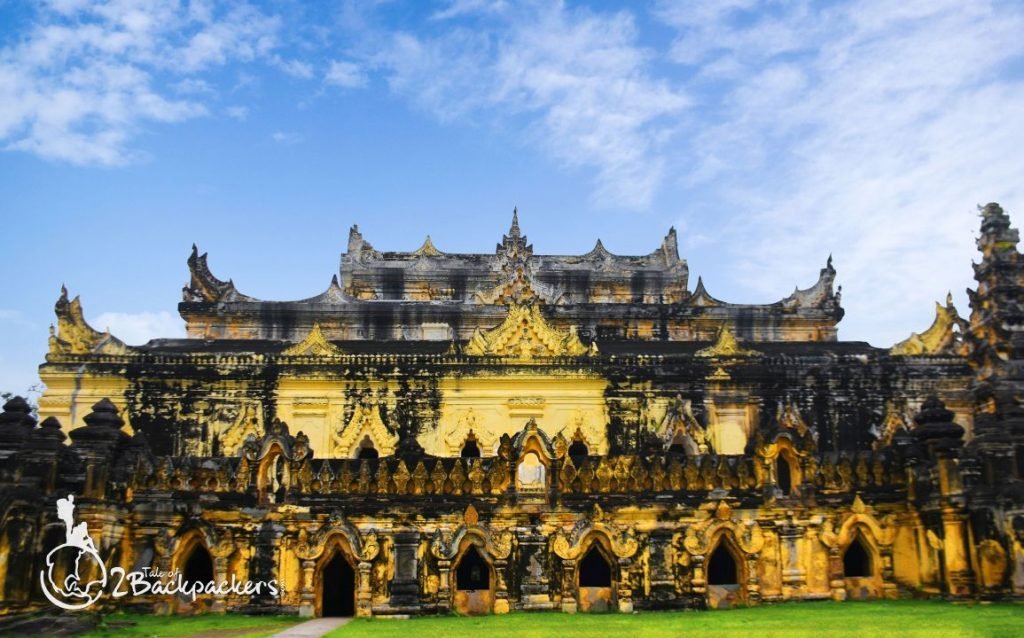
One of our favourite places at Inwa was no doubt the Yadana Hsimi Pagodas. The place is completely in ruins. There are small stupas in a courtyard and a large Buddha statue in ruins and really sorry state.
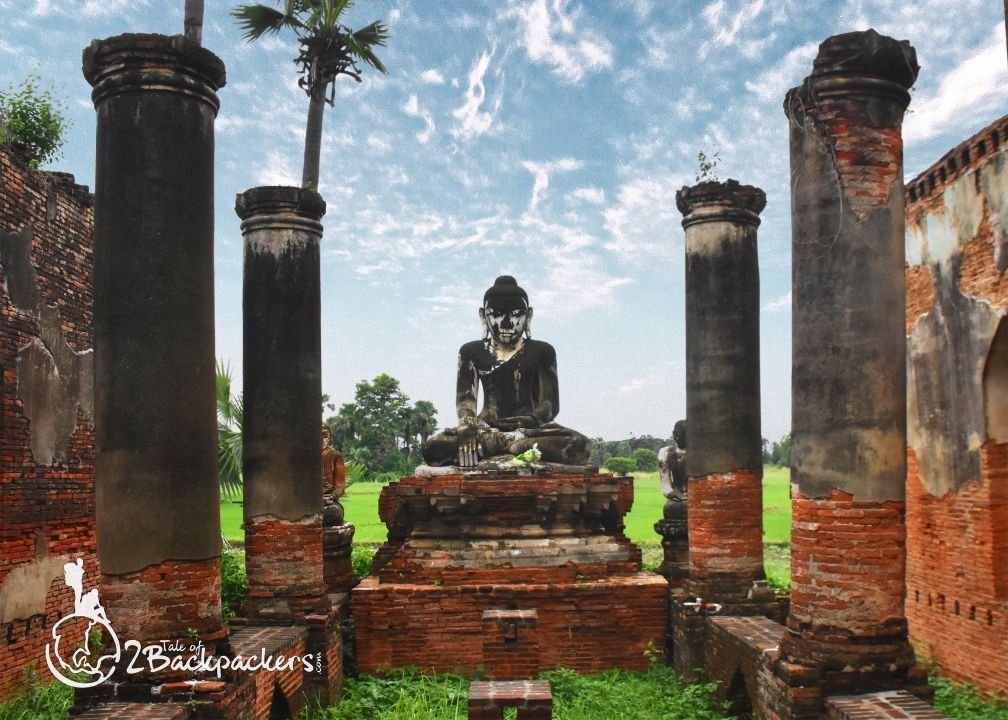
See how the Gold Leaf is made
The Burmese give gold leafs as an offering to Lord Buddha. They apply these thin gold leaves on the statues of Buddha. So the gold glittering statue you will see at the pagodas probably comes from these gold offerings. There are many workshops around Mandalay where you can see how these gold leafs are made. If you want, you can buy a gold leaf too.

If you have more time, you can visit the Snake Temple and Werawsana Jade Pagoda also.
Getting to and From Mandalay
During our Myanmar Trip, Mandalay was our first and last stop. We entered Myanmar by road crossing the Indo-Burmese border at Tamu and then travelled all the way to Mandalay by car. From Mandalay, we went to Bagan. We had wanted to take a cruise on Irrawaddy to Bagan, but unfortunately cruise was not available on the dates we were travelling. So we took a bus to Bagan.
You can reach Mandalay from any Burmese city by bus, train or private car. Buses are the best option. Mandalay also has an international airport.
Getting around in Mandalay
To get around Mandalay, you will have to hire a taxi. You can also rent a motorcycle to drive yourself around. Motorcycles usually take 10000-12000 Kyats per day.
You can rent a car to take you around the different places. For the first day, we visited the Amarapura region and Inwa in a car and on the second day we explored Mandalay, Sagaing and Mingun.
Here are a few more pictures of Mandalay that might inspire you to visit.

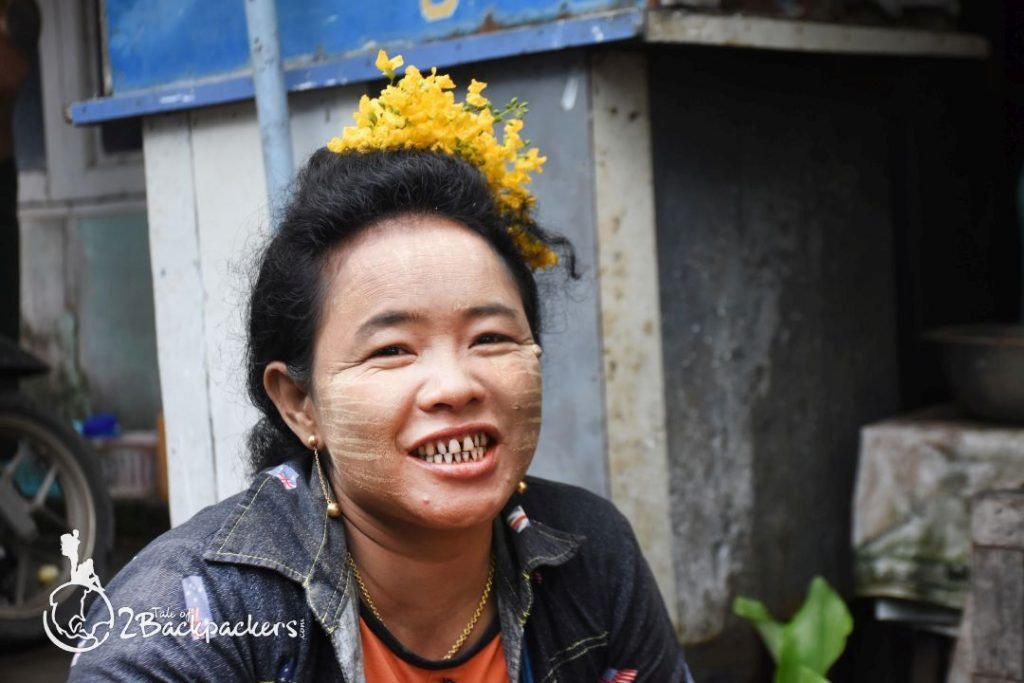



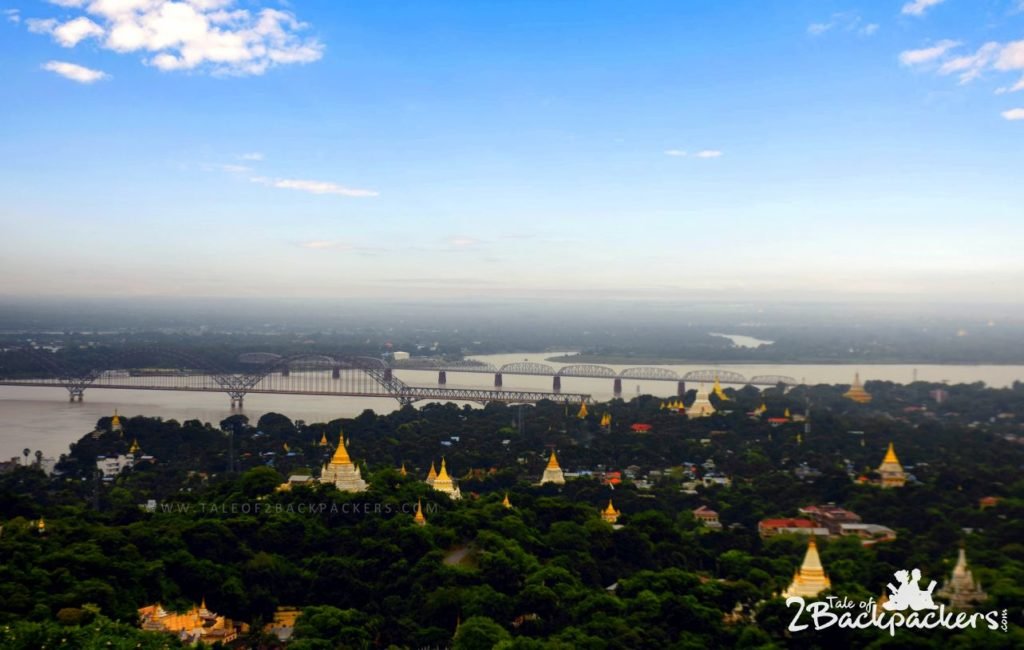
Pin it for a later read!




I have always longed to visit myanmar ever since I saw my sisters photos of her trip there. I always imagine drehte wouldn’t be much else apart from Bagan. But your post nicely highlights what she missed out in Mandalay. Will bookmark this Thanks for the heads up
Thank you Sreekar. Myanmar is simply beautiful and worth exploring.
The pagodas are such a distinct style, but each one has unique features. I can’t decide if I like the all white or all gold pagodas more. The white pagoda with gold leaf accents are such a beautiful blend of the extremes. And even a leaning pagoda, those are impressive.
That is the beauty of Mandalay. All are so beautiful. Thanks Jen!
I love this! I’m planning a trip to Southeast Asia for my next birthday and Myanmar is on my list. I definitely need to add Mandalay as a stopping point. There’s so much to see and do! I would love to scale Mandalay Hill and watch the sunset. I love how the numerous pagodas seem to just dazzle like stars in the sky!
Thank you Rachelle! Hope you have a lovely travel filled birthday. Enjoy Myanmar. It is a lovely place.
That’s an impeccable, impressive list of things to do in Mandalay.
Hsinbyume Pagoda is definitely my fav too. The architecture is just impeccable. That said, I think Away heritage village would be my top priority.
Hsinbyume Pagoda is surely a breathtaking sight! Thank you for appreciating.
Thank you Bhushavali. Glad that you liked the post.
Simply love your images and Mandalay is indeed beautiful. I still remember, talking about your trip with Debs when I was back in the UK, and how we were like, we too need to do this someday ?
Kuch bhi bolo, mazza toh road trip mein hi hai ?
Bilkul sahi! We should all plan a road trip soon! I so want to travel with all you guys! 🙂
What a comprehensive guide to everything to see in Mandalay. I’m not familiar with Myanmar or its history but you’ve shown me amazing places. I especially liked tidbits about visiting U-Bein Bridge at sunrise or that it would take over a year to read the great book. Did you get to make some gold leaf? It’s amazing that they use it as an offering.
Thank you Annick. No, we did not get to make some gold leaf! But we saw how they make one.
This is timely since we’re visiting Mandalay late this year. Thank you for sharing this very detailed travel guide. It is very helpful. I am so excited to see the beautiful temples and pagodas.
That is great! Mandalay is a great place. You can have a look at our other posts on Myanmar also. Thanks for the comment.
The Hsinbyume Pagoda looks gorgeous! It really does resemble clouds in the sky. I’d love to visit 🙂
Truly said. Thanks Francesca!
I’m planning to visit Mandalay in June and I’m so glad I came across this article! It answered a lot of the questions I had about the city and it gave me so many good ideas of activities to indulge in. Your post made me even more excited about the trip. Thank you for sharing this lovely article.
Thank you, Daniel. Have a great time in Mandalay. It is beautiful city.
I really appreciate this wonderful post that you have provided for us. A blog is brilliantly written and provides all the necessary information.
Hi Guys!
This is very interesting and amazing article for all readers, It is very helpful for all beginners especially for those who are in the field of traveling. I really enjoy the lovely reading of this article.
Thanks for sharing this article for us
Thank you Kate for your lovely comment!